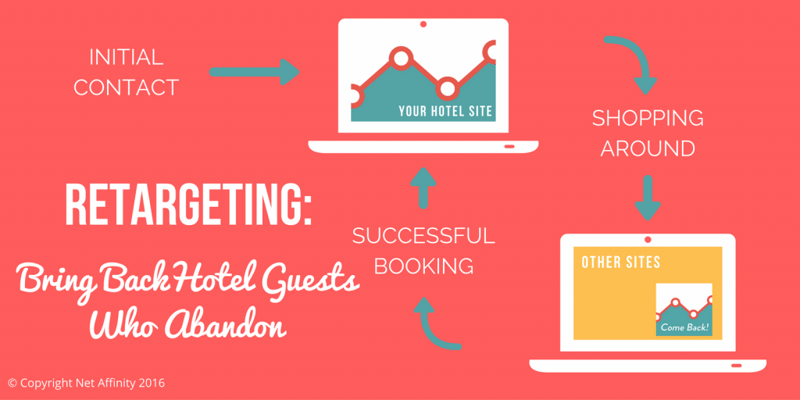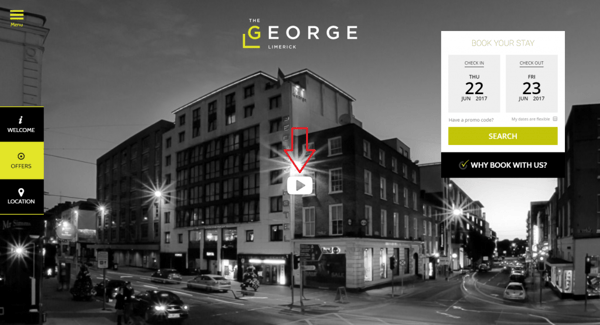Google AdWords is a powerful tool, reaching up to 90% of users worldwide. It’s the power behind, of course, the ads you see when you search on Google, but also behind countless image ads on thousands of sites across the web. Google AdWords is a valuable resource, and it’s one that most modern hotels rely on as a major part of their marketing strategy.
That said, AdWords’ interface can easily confuse inexperienced users. The multitude of options for campaigns and campaign settings makes it almost impossible to choose the right ones, unless you’re an expert.
To make life a little simpler, we have identified the 5 most important types of campaigns for the hotel industry. Today, we’ll be talking about how to run them, which metrics to watch out for, and why they work so well for hotels.
Let’s get started.
THE SEARCH NETWORK
The Search Network is where we recommend all hotels start. Users on the Google search platform are actively looking for a solution to their search.
CAMPAIGN: Brand Search Campaigns
The age-old hotel marketing debate: Should you bid on your own name or not?
The simple answer is yes. The question should not be whether to bid on your brand; it should be whether you can afford not to!
Most hotels rely on OTA’s to help them drive business and offer a billboard effect for their brand. However, direct bookings are always best. They come at a lower CPA, encourage loyalty and give you the opportunity to upsell.
Brand campaigns on the search network allow you to show your ads to users actively searching for your hotel. The casual traveller is often clueless about the channel or website the complete this booking on, so advertising a ‘guaranteed best rate when you book direct’ is a strong way to persuade them that direct is the best channel for them.
Additionally, it makes sure you appear near the top of search results. If you’re on OTA’s, it’s highly likely that they’re running ads on your brand name. Don’t let them appear first for your brand!
Your ads allow you to ensure your direct channel is front and centre of the user’s search, with the ad text clearly outlining the benefits to book direct.
Metrics to Watch
CPA, or Cost per Acquisition, is the most important metric with brand search campaigns. Are these campaigns returning a lower CPA than bookings on another channel?
Secondly, look at engagement with the landing page for your campaign – the page that your ads direct users to. You should look at bounce rate, time on page, and the number of pages per session those users have on your site. Are they only looking at the landing page, or are they moving on to the booking engine or the rest of your site?
Finally, what’s the ROI for your campaign overall? Was the profit worth it?
CAMPAIGN: Generic Search Campaigns
Staying on the search network, generic search campaigns allow you to reach users at the ‘prospecting’ or ‘shopping’ stage of the purchase funnel.
Think of long tail keyword searches from users aiming to find the hotel which meets their needs: ‘Limerick hotel with swimming pool’, or ‘Hotel beside Trinity College Dublin’
Needless the say, when the user is closer to the top of the booking funnel, these campaigns are costlier and are harder to convert. However, if you have a strong offering and you land the user in on an engaging landing page experience, generic campaigns allow you to drive traffic from users who would have perhaps never found your hotel.
Generic search campaigns benefit significantly when other sequential campaigns are in place. A combination of booking funnel remarketing and display remarketing work best. These help ensure that once you have paid for the user to visit your website, you do everything possible to ensure they return to book.
Metrics to Watch
Keep an eye on engagement with the advertisement (click through rate, or CTR, is a good KPI) and landing page engagement, including bounce rate, time on page, etc.
As before, you should also pay attention to ROI and CPA.
THE DISPLAY NETWORK
The Google display network (GDN) consists of millions of websites, news pages, blogs, and Google websites like Gmail and YouTube. The Google Display Network reaches 90% of Internet users worldwide. (Source: Google)
Advertising on the ‘Display’ network is often called “interruption marketing,” as it “interrupts” the viewer whilst they are browsing the web. In that sense, it’s the opposite of search advertisements, which show up when the user is actively searching on Google.
To have a successful display campaign, your strategy must be different to search campaigns. Importantly, your adverts and landing pages need to be carefully thought out.
CAMPAIGN: Remarketing on the Google Display Network
In simple terms, remarketing lists allow you to target users who have already engaged with certain content on your website based on a set of criteria. In other words, you’re not simply reaching out to people who’ve never encountered your brand, so you have a much stronger chance of getting conversions.
For example, one list may collect all users within a 30-day window who have visited your website, entered the booking funnel, yet didn’t yet complete a booking.
For this audience, we know they have been interested in booking your hotel, yet for some reason they didn’t complete. This might have happened because they weren’t sure yet, because they got distracted, or even just because they didn’t have their credit card on hand.
Here are a few ways to combat booking abandonment. One of those ways is, of course, remarketing.
Showing adverts to these users which promote your brand and remind them why they should book allows you to stay front and centre while they are in the decision process.
Tip: Eliminating anyone who has already completed their booking is important for these campaigns, so that your message reaches the correct audience. Make sure your audience excludes anyone who has, for example, reached the ‘Thank You for Booking’ page on your website.
For Display campaigns, both image and animated adverts tend to perform better than text adverts.
Metrics to Watch
Keep an eye on engagement with the advertisement (CTR) and landing page engagement, including bounce rate, time on page, etc.
As before, you should also pay attention to ROI and CPA, with a special focus on view through conversions and direct conversions.
CAMPAIGN: Generic Display Campaigns
Generic Display campaigns are at the top end of the funnel and fall under ‘prospecting’. Often, the key strategy for display campaigns is to drive brand awareness to an audience of users who have not engaged with your brand before, but who might be interested.
Knowing where and how your existing audience engages with your brand is more important than ever. This information should mould your display campaign strategies. The data in Google Analytics can arm you with everything you need to know here, from demographics to audience interests.
Equally important is ensuring the message is precise and landing page is highly relevant to your target audience. A vague or bland campaign will have little impact on your audience, and if you don’t have a compelling landing page, you risk losing their interest immediately.
When creating display campaigns, your ads can be matched to websites that include content that’s related to your business or to your customers’ interests. You can set up targeting to match your ads based on topics, interested audiences, user demographics, and more.
Metrics to Watch
As above, keep an eye on engagement with the advertisement, but you should also look at where these campaigns fall in your conversion funnel. Since they’re often more about brand awareness than specifically driving bookings, CTR is less important here. Instead, look at where they lie in your attribution model.
As before, you should also pay attention to ROI and CPA, with a special focus on view through conversions.
THE VIDEO NETWORK
The video network is the most underutilised network by the hotel industry, primarily due to the lack of quality and relevant videos available at the hotel level.
A strong video doesn’t have to cost a lot to produce, and it doesn’t need to be 15 minutes long – in fact, it shouldn’t! If you have an iPhone, a tripod and a sunny day, you’re well on your way.
The George Hotel Limerick offers video directly from their homepage, and then can use those videos to market their hotel on the Google Video Network
Shorter is better than longer, and small topics are better than big ones. We would recommend that hotels create 4 separate videos for different business areas, rather than 1 longer generic hotel video.
For example, you might want a video for your weddings, your restaurant, your corporate business and one to show off your grounds. Another hotel might swap corporate business for families, or add in a video about their spa or gold course.
Ideally you’re creating videos that are short, sweet and to the point, with a clear message and call to action. Anything from 20-40 seconds would be recommended. The great thing about videos is that once you have videos created, you can use them across multiple platforms – social platforms, your website, and of course the video network.
Over half of video content is viewed on mobile. Make sure the video makes sense without sound and don’t include microscopic text.
51% of marketing professionals worldwide name video as the type of content with the best ROI.
Marketers who use video grow revenue 49% faster than non-video users.
CAMPAIGN: Video Remarketing
Just as we do with Display remarketing, we suggest hotels run video remarketing. It’s a super engaging way to showcase your hotel to someone who has just been on your website.
A relevant video to this audience can help to reinforce your USP or Book Direct message just that little bit more effectively than an image or text advert.
It’s important that the video:
- Is relevant to the audience
- Has a clear call to action
- Has a strong landing page experience
Metrics to Watch
As always, keep an eye on engagement with the advertisement (in this case, how long are they watching the video, and are they clicking through?) and landing page engagement, including bounce rate, time on page, etc.
As before, you should also pay attention to ROI and CPA, with a special focus on view through conversions and direct conversions.
Conclusion
From our perspective, these are the 5 most important types of campaigns to run on Google AdWords for the hotel industry.
Google AdWords is a powerful tool, and your hotels needs to have it as a major part of their marketing strategy to be truly competitive. Hopefully, even if you don’t work with a digital marketing agency, this guide will give you the right tools to start promoting your hotel on AdWords. If you do work with an outside agency, make sure you’ve asked about these campaign types and whether they would suit your hotel!





